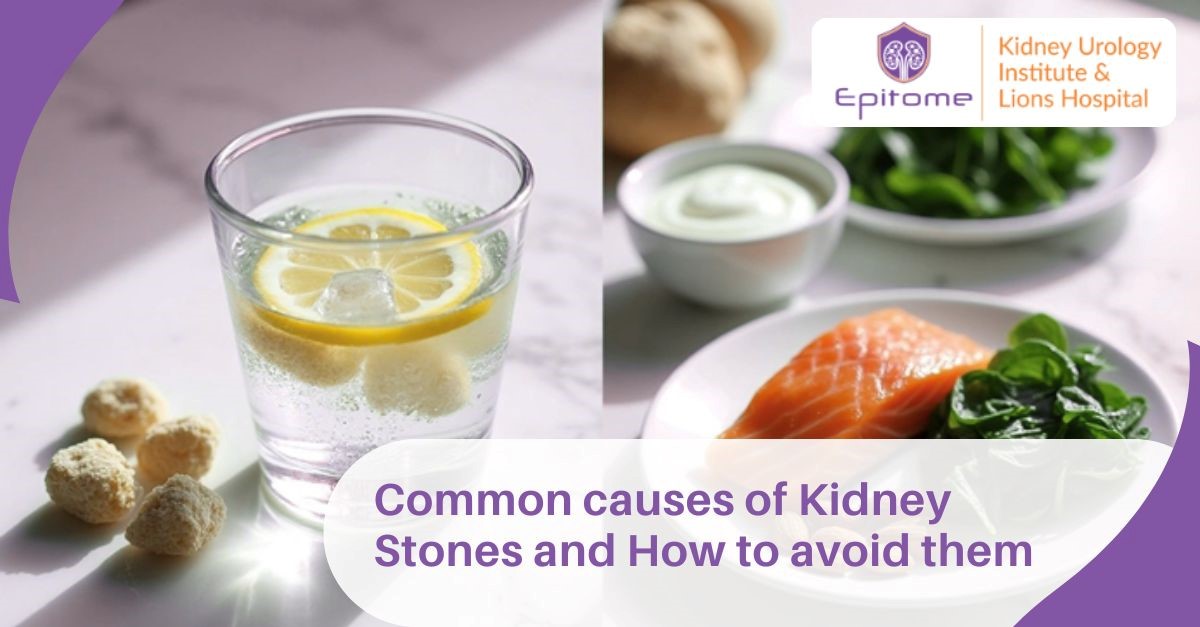Kidney stones symptoms can range from excruciating pain to blood in urine, affecting one in ten people during their lifetime. Unfortunately, these painful mineral deposits are becoming increasingly common across India with the prevalence of kidney stones has risen sharply, with recent studies estimating that 12% of the population is prone to urinary stones, and some regions report a prevalence as high as 21 % among adults.
Even small stones can cause extreme pain as they move through the urinary tract, often taking up to three weeks to pass naturally. If you’re facing recurring symptoms, consulting a Kidney Stones Specialist in Delhi can offer valuable insight and targeted treatment.
What causes kidney stones?
Kidney stone formation is a complex process that occurs when minerals crystallize in the urinary tract. These painful deposits affect approximately 1 in 11 people during their lifetime, with men experiencing them twice as often as women. Understanding the underlying mechanisms can help prevent their recurrence.
How kidney stones form in the body
Kidney stones develop through a series of steps involving crystallization, nucleation, growth, aggregation, and retention within the kidneys. The process begins when urine becomes supersaturated with certain minerals. Under these conditions, microscopic crystals form and attach to each other, gradually accumulating into a small mass or stone.
This crystallization typically starts on the interior surface of the kidney, where urine leaves the kidney tissue and enters the urinary collecting system. As crystals bond together, they either pass through the urinary tract or continue growing within the kidney. Consequently, some stones remain small like grains of sand, while others grow substantially larger over time. For individuals with recurrent issues, a consultation with the Best Nephrologist in Delhi can help uncover underlying causes.
The role of minerals and urine concentration
The primary driver of stone formation is supersaturation—when there’s too much waste and insufficient liquid to dilute it. Essentially, your kidneys normally filter excess salts, minerals, and waste products from metabolic processes. Nevertheless, when urine contains more crystal-forming substances than the fluid can dissolve, the stage is set for stone formation.
Several factors increase supersaturation risk:
- Low urine volume (producing less than 1 liter daily)
- High urinary acidity or alkalinity (depending on stone type)
- Excessive excretion of stone-forming minerals
- Insufficient crystallization inhibitors like citrate
Furthermore, urine pH plays a crucial role—calcium phosphate stones form in alkaline urine, whereas uric acid stones develop in acidic environments (pH below 5.5). Regular check-ups with a Kidney Stones expert in Delhi NCR can help monitor these biochemical risk factors effectively.
Common types of kidney stones
Calcium stones constitute approximately 80% of all kidney stones. These primarily exist as calcium oxalate mixed with calcium phosphate. Calcium oxalate stones form when oxalate (found in foods like spinach, chocolate, and nuts) combines with calcium in the urine.
Uric acid stones account for 8-10% of cases worldwide and are particularly common among people with obesity and insulin resistance. Unlike calcium stones, these form exclusively in acidic urine with pH below 5.5.
Struvite stones (7-8% of all stones) develop during urinary tract infections with bacteria that produce urease, creating an alkaline environment. These “infection stones” can grow rapidly and form large staghorn calculi.
Cystine stones (1-2% of cases) result from a genetic disorder causing excessive cystine excretion. Meanwhile, rare medication-induced stones can form from drugs like atazanavir, indinavir, and triamterene.
For proper identification and personalized care, seeking help from the Best Urologist in Delhi can ensure accurate diagnosis and effective treatment.
Top lifestyle factors that Increase your Risk
Several lifestyle factors significantly increase your risk of developing painful kidney stones. Understanding these factors can help you take preventive measures to protect your urinary health.
Low water intake and dehydration
Dehydration stands out as the primary driver of kidney stone formation. When you don’t drink enough water, your urine becomes concentrated with minerals that can crystalize. Studies show that lower daily water intake (1.45 liters vs. 1.51 liters) is directly associated with increased stone development. Moreover, reduced diuresis leads to supersaturated urine, creating an ideal environment for stones to form. To prevent this, aim for a urine output of 2-2.5 liters per day, which typically requires drinking at least eight 8-ounce glasses of water daily.
High-sodium and high-protein diets
Dietary choices play a crucial role in stone formation. Higher sodium intake increases the risk of kidney stones by 11% to 61%, with the most pronounced effect in those consuming the highest amounts. Sodium raises urinary calcium excretion—Kleeman’s research demonstrated that increasing dietary sodium from 19 to 419 mEq/day increased calciuria by 82%. A diet review with the kidney Stones treatment Hospital in Delhi can offer customized dietary advice.
Similarly, diets rich in animal protein increase stone risk by causing urinary acidification and reducing citrate levels. Animal protein raises acid levels in urine, making it easier for calcium oxalate and uric acid stones to form.
Obesity and lack of physical activity
Increasing BMI category is associated with a 1.19 to 2.01-fold increased risk of kidney stones after adjustment. Obese patients typically have higher percentages of urate, calcium oxalate, and calcium phosphate stones. This occurs because obesity alters urine composition, increasing excretion of urate, sodium, ammonium, and phosphate.
Physical activity offers protection—individuals in the highest quartile of physical activity have a 50% lower risk of kidney stones regardless of genetic susceptibility. Even light-intensity physical activity is associated with a 34% decreased risk.
Family history and genetic conditions
Genetic factors strongly influence stone formation—a positive family history appears in 30-60% of individuals with kidney stones. Specifically, 8.1% of kidney stone formers carry genetic variants predisposing them to stones. Those with genetic predisposition typically develop stones at a younger age (30 vs. 36 years) and often experience recurrent episodes. Consulting a Kidney Stones Specialist in Delhi can help identify genetic contributors and manage them proactively.
How to Avoid kidney stones through daily habits
Simple daily habits can dramatically reduce your risk of experiencing painful kidney stone symptoms. By making a few targeted changes, you can protect your kidneys and avoid the agony of passing stones.
Drink enough water throughout the day
Hydration stands as the most effective strategy for preventing kidney stones. Aim to drink enough fluids to produce 2.5-3 liters of urine daily. For most people, this means consuming more than 3 liters (approximately 12-13 glasses) of water per day. Your urine should appear almost clear – darker urine indicates you need more fluids. Adding a squeeze of lemon or lime juice to your water provides citrate, which helps block stone formation.
Limit salt and animal protein in your meals
High sodium intake increases calcium in your urine, raising stone risk. Keep your daily sodium below 2,300mg – about one tablespoon of salt. Check food labels carefully, as processed foods often contain hidden sodium.
Likewise, excessive animal protein (beef, chicken, pork, eggs, fish) increases uric acid levels and reduces citrate in urine. Limit meat consumption to no more than 3 ounces at lunch and 3 ounces at dinner.
Eat calcium-rich foods, not supplements
Despite common misconceptions, dietary calcium actually helps prevent kidney stones. Consume 1,000-1,200mg of calcium daily from foods rather than supplements. Studies show high dietary calcium decreases stone risk by 35%, while calcium supplements may increase risk by 20%.
Pair calcium and oxalate foods together
Eating calcium-rich foods alongside oxalate-containing foods (spinach, nuts, chocolate, tea) prevents stone formation. This pairing causes oxalate to bind with calcium in your digestive tract before reaching your kidneys. For instance, add milk to your tea or cheese to your spinach salad.
Avoid sugary drinks and processed foods
Recent research reveals people consuming 25% or more of daily calories from added sugars face an 88% higher risk of developing kidney stones. Sugar increases urinary calcium excretion. Especially avoid dark sodas and beverages with high-fructose corn syrup. Instead, choose water, unsweetened tea, or diluted fruit juices.
Medical support and long-term prevention
For those who have experienced kidney stones, professional medical support plays a vital role in long-term prevention. Beyond lifestyle modifications, healthcare providers offer specialized treatments and monitoring to reduce recurrence risk.
When to see a doctor for kidney stone symptoms
Seek medical attention immediately if you experience severe pain, visible blood in urine, fever with chills, or difficulty urinating. If you experience persistent symptoms or recurrent stones even milder ones like pain during urination, cloudy or foul-smelling urine, or wave-like pain, it’s advisable to consult the Best Nephrologist or a trusted Kidney Stones expert for proper evaluation and management. Although small stones often pass naturally, larger stones may require medical intervention to prevent complications.
Medications that help prevent stone formation
For recurrent stone formers, physicians may prescribe preventive medications based on stone type:
- Thiazide diuretics reduce urinary calcium levels and are recommended for calcium stone formers with hypercalciuria. These medications can lower recurrence risk from 47% to 24% over three years.
- Potassium citrate increases urine alkalinity and citrate levels, helping prevent calcium, uric acid, and cystine stones. This treatment can reduce recurrence rates from 44% to just 11% within two years.
- Allopurinol decreases uric acid production and is beneficial for uric acid stones or calcium oxalate stones with hyperuricosuria.
Monitoring urine and blood for risk factors
Following treatment initiation, doctors recommend obtaining a 24-hour urine specimen within six months to assess response to therapy. Subsequently, annual urine testing helps monitor adherence and metabolic response. Periodic blood tests are also essential to check for potential medication side effects.
Expert Kidney Care in Delhi
For those seeking specialized kidney care in Delhi, Epitome Hospitals stands out as a premier Kidney Urology Institute in Delhi. They offer a comprehensive range of services, from diagnostics to advanced Kidney treatments, including dialysis and kidney transplantation.
Our Hospital is equipped with state-of-the-art technology, ensuring patient safety and high-quality care. Our patient-centric approach focuses on personalized treatment plans, including dietary counseling and management of conditions like Kidney stones. This commitment to excellence and comprehensive care makes us a noteworthy option for kidney-related ailments.
Take Control of Your Kidney Health
Preventing kidney stones is achievable through informed lifestyle choices, primarily by staying well-hydrated, moderating sodium and animal protein, and understanding dietary pairings like consuming calcium-rich foods with oxalate sources. For those facing kidney stone issues or seeking expert advice, finding the Best kidney Stones treatment Hospital in Delhi is crucial.
With access to the Best Nephrologist in Delhi at a specialized center like Epitome Hospitals, patients can receive tailored medical support, including advanced diagnostics, minimally invasive treatments, preventive medications, and diligent monitoring. Prioritizing these strategies and seeking specialized care when needed is key to long-term urinary health and avoiding the distress of kidney stones.
Ready to protect your kidney health or seek expert care? Book your appointment with our specialists at Epitome Hospitals today!

